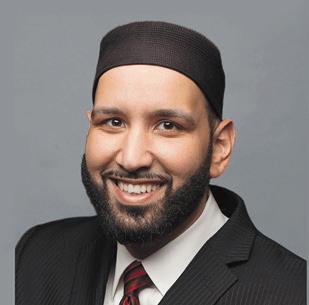Guidance on Death and Grieving




For Those Left Behind...
Guidance on Death and Grieving
First published in England by Kube Publishing Ltd Markfield Conference Centre Ratby Lane Markfield Leicestershire LE67 9SY United Kingdom
Tel: +44 (0) 1530 249230
Website: www.kubepublishing.com Email: info@kubepublishing.com
© Omar Suleiman 2023 All Rights Reserved.
The right of Omar Suleiman to be identified as the author of this work has been asserted by him in accordance with the Copyright, Design and Patent Act 1988.
Cataloguing in-Publication Data is available from the British Library.
ISBN 978-1-84774-193-6 Paperback
ISBN 978-1-84774-194-3 Ebook
Cover design and typesetting: Jannah Haque Printed by: IMAK Ofset, Turkey.
A brief guide to some of the letters and symbols used in the Arabic transliteration in this book.
May the peace and blessings of Allah be upon him. May Allah be pleased with them both.
May Allah be pleased with her. May peace be upon her.
Glorified and Majestic (is He). May peace be upon them both.
May Allah be pleased with him. May peace be upon him.
To Allah belongs that which He has taken, and that which He has given.
And everything is with Allah in accordance with its prescribed time.
So be patient and seek reward [�rom Allah].
Prophet Muhammad ﷺ
Fifteen years ago, I lost the most beloved person in the world to me. My mother, May (also spelled Mai) Hashem Suleiman, died suddenly from a stroke leaving behind my father, my brother, and myself. She was a person of piety who longed for her Lord and left the world at peace with it.
But the turmoil in our hearts was, and still is, deep. I was young when my mom died, just appointed as an Imam of a Masjid, and between my nikah and wedding. As I sought to understand why, I also sought to exert myself towards what would be of benefit to her and me.
I dove into the works of Ibn al-Qayyim and other scholars who spoke of the realm of souls and wondered whether my mom could hear me when I visited her. I wanted so badly to both be connected to her, and to benefit her. I wondered if she knew of my wedding, or now my three children. Many questions flowed through my mind, questions that I would later learn many others shared as well.
Fast forward to 2020, at the peak of the pandemic, many community members passed on. This was especially true of some of our elderly community members who were of course the most vulnerable. As I started to receive question after question, I recognized that
pain in the face of many people who were young like me and who, in some cases, lost both parents within days of each other.
I realized we needed to put together a resource to help people through this difficult period. Something that would help anyone who experiences the loss of a loved one, and has questions about what happens next and how to move forward.
Our team at Yaqeen quickly pulled together and decided to record the series, “For Those Left Behind”, to help people navigate this journey of death and connection after. This book is a result of the research that went into making the video series.
I pray Allah accepts it on behalf of my mom, and on behalf of all of those who have preceded us. May Allah have mercy on our loved ones, allow us to follow them in righteousness, and join us together in His reward.
Āmīn.
Dr. Omar Suleiman President and FounderYaqeen Institute for Islamic Research
You entered this world with the call to prayer (adhān) being recited over you, but without any prayer (ṣalāh) being performed. When you depart from this world, there will be a prayer read over you, but there will be no call to prayer for it. The contrast between these two epic events has much significance. It is as if to say that the fleeting life which you experience in this world is as short as the duration between the call to prayer and the prayer itself.
While you were still inside the womb of your mother, an angel was appointed to register the duration of your life and the exact date of your death. This paradoxically implies that the moment you enter this world, you are actually already in one sense on your way to exit from it. All of these stark realities constitute a powerful reminder that we should consistently perform our prayers before we are prayed upon. This is because this life is far shorter than we may initially think.
Upon their death, every Muslim is entitled to have the funeral prayer (ṣalāh al-janāzah) performed upon them by their fellow believers. Not only is it a religious act of worship, but it is also a way to bid farewell to our loved ones. Furthermore, it constitutes a sobering reminder that we too will one day follow them on the same path. The wise person is the one who always visualises the fateful day when the funeral prayer is offered over their dead body, and allows that thought to shape their life trajectory. The Prophet ﷺ taught us how to perform the funeral prayer in elaborate detail. The prayer is unique in both its form and order, as it consists of four successive takbīrs. After the first takbīr we are required to recite Sūrah al-Fātiḥah. After the second, one should send prayers (ṣalawāt) upon the Prophet ﷺ, preferably through a full reading of the al-Ṣalāh al-Ibrāhīmiyyah, which we are already accustomed to reciting during our regular prayers. After finishing it, one then reads the third takbīr, which should be followed with a duʿā’ for the deceased. There are a number of confirmed supplications which have all been transmitted from the Prophet ﷺ. Among them is the following:
living ones, deceased ones, present ones, absent ones, our little youngsters, elderly folk, our males, and our females. O Allah, whoever You have decreed to live amongst us, then let them live upon Islam. And whoever You decree to die, then have them die with full faith.”
Abū Hurayrah has a moving report which every Muslim should deeply reflect upon. He narrates that after their death, a person will experience an elevation in rank in the sight of Allah b . Upon being elevated, this person will ask Allah b :
ادب� ء�� �� ،ى�ر ��
“O my Lord, what is this?”
This man will be surprised, and wonder what the source of this elevation is. Allah b will then explain this rise in rank with the following answer:
كلرَ�ْ��س� كدلو
“Your son sought forgiveness for you.”
Whenever the Prophet ﷺ made du ā’ for the deceased, he would always ask Allah b to forgive them first. It is important to supplicate in a sincere and desperate manner, such that every word comes directly from the heart.
A man came to the Prophet ﷺ and mentioned that his mother had suddenly passed away. This ultimately meant that she was unable to give a final will or testament. He then mentioned to the Prophet ﷺ: ��د�ُ� �ملك�و�
“Had she been able to speak, then she would have wanted to give charity.”
He then asked the Prophet ﷺ if he could give charity on her behalf. The Prophet ﷺ told him to do so. The reason why I began with this narration is because it provides a very important yet oft-ignored lesson. One should observe this man’s carefully thought-out starting point. He was asking himself what his mother’s last request and wish would have been if she could speak. He knew that she would not desire a grave decorated with
marble, topped with an elevated tombstone. She would not want her gravestone to be engraved with some ornamental writing or a passage from the Qur’ān. Neither would she request his son to burn some incense on top of her grave.
Instead of having you engage in such frivolous and pointless endeavours, what would your deceased loved one actually seek and desire? They would ask you to perform something beneficial on their behalf, such as the distribution of charity and other good deeds. This is because after their death they are in dire need of additional good deeds. In fact, if they could address you directly, they would likely become angry and admonish you to spend money on these worthless acts. After all, many of these pursuits and schemes have no religious benefit whatsoever. Unfortunately, during many funeral processions, one finds exorbitant amounts of wealth being spent on tombstones, grave design schemes, and related matters. Sometimes the level of spending is so great that it can actually be considered sinful in the sight of Allah b . Ultimately, whenever we do something for the deceased, we should always ask what they would want us to do if they could address us.
At the same time, we should be considerate of metaphysical events that occur in the other realm as well. The Prophet ﷺ mentioned something beautiful and thought-provoking that occurs when a righteous person is in their grave. He stated that while they are buried, they will be suddenly greeted with a special visitor who is exceptionally beautiful, adorned in delightful clothing, and characterised with an extremely pleasant fragrance. Upon approaching the grave, the visitor will address the deceased with the following words:
You are not supposed to move on from them. Instead, strive to move forward with them. There is in fact no such thing as moving on. The Prophet ﷺ is the example and standard we are expected to emulate, and we know that he never moved on after Khadījah passed away. Instead, he always cherished the priceless moments he shared with her. He kept her memory intact such that ʿĀ’ishah said: “I did not feel jealous of any of the wives of the Prophet as much as I did of Khadījah, even though I never met her.” Yet the Prophet’s constant mention and praise of Khadījah was that which kept her name alive. Whenever the Prophet ﷺ sacrificed an animal or received the meat of a sacrifice from someone else, he would always send a share of it to Khadījah’s friends. In addition, he would provide them gifts and other valuables. Whenever he heard the voice of her sister, he would rush to the door because she sounded just like her. He always thought about her. There is a statement from
pon visiting the graves of family and friends, you get to finally realise that you do not go there to bid farewell, instead it is to say: “See you soon.” You pray upon them until one day, you are prayed upon, you visit them until you are visited. But you still love them and long for their company and wonder about them, while you are still in this world.
Where are they? Do they know how I am feeling? Do they know when I visit them? Do they hear me? What should I be doing to make things better for them? And what should I be doing to make things better for myself, while I wait to hopefully join them, in the company of the righteous? This short book takes you on a journey of knowledge, wisdom and guidance for those left behind.

Imam Omar Suleiman is the Founder and President of the Yaqeen Institute for Islamic Research and Professor of Islamic studies at Southern Methodist University in Dallas, USA.



ISBN 978-1-84774-193-6 US$11.95
In association with Yaqeen Institute for Islamic Research